- Home
- James L. Swanson
Manhunt: The 12-Day Chase for Lincoln's Killer Page 4
Manhunt: The 12-Day Chase for Lincoln's Killer Read online
Page 4
But first he wanted to ride with Mary. He had made the appointment two days ago when he sent her a note, “written from his office … a few lines, playfully and tenderly worded, notifying, the hour, of the day, he would drive with me!” The war had increased their estrangement. Official Washington, under a heavy Southern influence, had snubbed her as a gatecrasher and a western parvenu from the start, despite her aristocratic Kentucky slaveholding origins. She had been emotionally distraught since the death of their favorite son, eleven-year-old William Wallace Lincoln—“Willie”—in February 1862, and she had fallen under the spell of mediums and spiritualists at White House séances. The president, who scorned her infatuation with the spirit world, once attended one of her supernatural events. It was enough to entice a music publisher to issue a sheet-music parody, “The Dark Séance Polka,” the cover art depicting a wild Executive Mansion séance with objects flying through the air. Mary was at heart a kind woman, but her critics preferred to criticize her personal eccentricities—her expensive shopping habits both for the White House and for herself, and her raging, jealous temper—rather than to praise her good works for soldiers or her absolute loyalty to husband, liberty, and Union. And the demands of the war had been so great that the president spent less and less time with her.
Lincoln knew he had to change that now. He wanted to talk to Mary about their future. He escorted her to the open carriage, and before the coachman drove on she asked him if anyone should accompany them on their ride.
“No,” he replied, “I prefer to ride by ourselves today.”
Lincoln’s joy was irrepressible. Mary Lincoln had noticed it on their recent river cruise: “Down the Potomac, he was almost boyish, in his mirth and reminded me, of his original nature, what I have always remembered of him, in our own home—free from care, surrounded by those he loved so well and by whom, he was so idolized.”
Now, during their afternoon carriage ride, Mary spoke to him about his happy mood.
“Dear husband, you almost startle me by your great cheerfulness.”
“And well I may feel so, Mary,” the president replied. “I consider this day, the war has come to a close.”
“We must both, be more cheerful in the future—between the war and the loss of our darling Willie—we have both, been very miserable.”
During their leisurely ride, which took them, among other places, down to the Navy Yard near Capitol Hill, where they inspected an ironclad naval vessel, the monitor Montauk, the president told his wife that they must try to be happy again. That he would like to see the Pacific Ocean. That perhaps at the end of his second term in office, they would move to Chicago and he would practice his trade again. Freed from the vexations of war and death—he would send no more armies of young men to die—Lincoln dreamed of the future. Yes, they would be happy again. Later, Mary remembered that on “The Friday, I never saw him so supremely cheerful—his manner was even playful.”
aT LAFAYETTE PARK NEAR THE WHITE HOUSE, MAJOR HENRY Rathbone and his fiancée, Clara Harris, awaited their hosts at the residence of Senator Harris, at Fifteenth and H streets. The Lincolns had promised to pick them up on the way to the theatre, but they were almost twenty minutes late. The major and Miss Harris hoped that the president had not forgotten them. Then, about 8:20 P.M., the carriage appeared. The popular young couple, although known to the Lincolns, was not their first choice. After the Grants changed their plans, the Lincolns invited several people to join them, but all declined. Finally they settled on Rathbone and Harris who, ignorant of how many others had declined before them, were delighted to accept. There was happy talk during the ten-minute ride to the theatre, Miss Harris remembered, reflecting the spirit of a week of joy and celebration: “They drove to our door in the gayest spirits; chatting on our way.” At Ford’s the management decided not to hold the curtain for the presidential party, and the play began without them.
Dr. Charles Leale was behind schedule, too. “After the completion of my daily hospital duties, I told my ward master that I would be absent for a short time…. I changed to civilian’s dress and hurried to Ford’s Theatre.” Leale hoped there was still time to purchase a good seat. “I arrived late at the theatre, at 8.15 P.M., and requested a seat in the orchestra, whence I could view the occupants of the President’s box…. As the building was crowded, the last place vacant was in the dress circle. I was greatly disappointed, but accepted this seat, which was near the front on the same side and about forty feet from the President’s box.”
Finally the lookout at Ford’s spotted the big black carriage turning down Tenth Street. It slowed to a halt beside the elevated wood platform in front of the theatre, constructed especially to assist carriage riders in getting out of their vehicles and avoiding the muddy street. The Lincolns, Rathbone, and Harris disembarked, and the chief usher escorted them through the lobby, up the winding staircase, and across the dress circle—the first balcony—to their box. Abraham Lincoln’s entry to Ford’s Theatre at 8:30 P.M. on April 14, 1865, was majestic in its simplicity. He arrived with no entourage, no armed guards, and no announcement to the crowd.
Before the presidential party reached the box, the actors, musicians, and patrons became aware that the Lincolns had arrived. The audience shouted and cheered. The actors onstage stopped performing. Orchestra conductor William Withers was looking forward to leading his players in a special patriotic song, “Honor to Our Soldiers,” that he had composed just for the occasion. That would come later. Now, he led his orchestra in a stirring rendition of “Hail to the Chief.” The audience went wild.
Charles Leale had arrived in time to witness it all: “Many in the audience rose to their feet in enthusiasm and vociferously cheered while looking around.” Leale looked around, too, and saw Abraham Lincoln standing nearby. “Turning, I saw in the aisle a few feet behind me, President Lincoln, Mrs. Lincoln, Major Rathbone, and Miss Harris. Mrs. Lincoln smiled very happily in acknowledgment of the loyal greeting, gracefully curtsied several times, and seemed to be overflowing with good cheer and thankfulness.” But it was the president who Leale desired to behold. “I had the best opportunity to see distinctly the full face of the President, as the light shone directly upon him. After he had walked a few feet he stopped for a moment, looked upon the people he loved, and acknowledged their salutations with a solemn bow.”
At the supreme moment of victory they cheered their Father Abraham, the man who, after a shaky start in office, learned how to command armies, grew in vision and eloquence, brought down slavery, and who, just six weeks ago, had given the most graceful and emotionally stunning inaugural address in the history of the American presidency. And as he promised he would, he had saved the Union. Lincoln stood in the box and bowed to the audience.
The spontaneous homage, the band, the hissing gaslights, the packed house, the fresh, moist scent of spring in the air, the recent and joyous news from the front—all combined to create a singular and magical moment. “The President,” remembered Clara Harris, “was received with the greatest enthusiasm.”
James Ferguson was not so impressed. He had seen Lincoln before. Where was the man who Harry Ford had promised would be there, the one whom he had come to see? “I supposed that probably Grant had remained outside, so as not to create any excitement in the theatre, and would come in alone, and come in the box.” Ferguson was so determined to see the general that, for the next hour and a half, he would spend as much time staring at the president’s box as he would watching the stage. “I made up my mind that I would see him … and I watched everyone that passed around on that side of the dress circle towards the box.” No one, he promised himself, was going to enter that box unobserved.
Chapter Two
“I Have Done It”
LEGEND HAS IT THAT JOHN WILKES BOOTH WAS HIDING OUTside in the shadows near the front door of Ford’s as the presidential carriage rocked down the uneven dirt street and slowed to a stop, but no one really knows where he was at that precise moment. On April 29
, 1865, Clara Harris wrote in a letter, “They say we were watched by the assassins; ay, as we alighted from the carriage … and when I think of that fiend barring himself in with us, my blood runs cold.” Wherever Booth was it is almost certain that somehow he verified with his own eyes that the Lincolns were actually inside the theatre. And he probably wondered at the identity of Lincoln’s guests and gauged whether Major Rathbone looked like the type who could pose a threat to his plans. It didn’t matter, really; no one was going to stop him from going through with it.
Next door at Peter Taltavul’s bar, the Star Saloon, it was a night like any other when the lights were on at Ford’s. Some playgoers downed a quick one before the show; others would come in during intermission to fortify themselves.
It was now about 9:00 P.M. Time for Booth to go inside the theatre for the first time since the Lincolns had arrived. Although the actor, like the Lincolns, entered Ford’s after Our American Cousin started, he was still on schedule. The play was like a clock, every word spoken was another tick of the second hand. After hearing just one snippet of dialogue, Booth would know, to the minute, how much time had elapsed from curtain raising, and how much time remained in the performance. He knew that he had at least another hour. He left Ford’s
In a little while, he returned to his alley stable, where he and Spangler had left the bay mare. Booth unlocked the door, threw his shawl over the horse’s back, and saddled her. He led his rented horse down Baptist Alley by the reins, up to the back door of Ford’s. He would have tied the animal to a hitching post behind the theatre, but he remembered the stable man’s warning that this horse did not like to be tied. She would pull at the post to break free. And anyway, what if he left the horse unattended and when he came back later discovered that someone had stolen her? Better to have someone hold the reins until he returned. He called through the open back door: “Ned. Ned Spangler!” There was no reply.
Inside Ford’s, employee John Debonay tracked down Ned: “Booth is calling you.” Spangler stepped into the alley.
“Hold this mare for ten or fifteen minutes,” Booth instructed him.
“I have not time,” Ned replied. The play was going on. He could not neglect his backstage duties and waste time holding a horse. He was needed at his post in the wings to shift scenery. He offered to summon another employee, John Burroughs, nicknamed “John Peanut” by his fellow staff members after the snack he sold to patrons.
Spangler sent for John Peanut. Booth gave Ned the reins, cautioning him that this horse would not stand tying and that she had to be held. Booth went into the theatre. When John Peanut came out he demurred, saying he was needed at the front of the theatre to make sure that people didn’t sneak in without paying. After a minute or two of bickering, he gave in and accepted the reins from Spangler. Ned went back to work. Mary Jane Anderson, a black woman who lived in an alley house behind the theatre, watched Booth lead his horse up the alley, walk past her front door, and call Ned Spangler. Once Booth went inside Ford’s, she couldn’t see the horse anymore but could hear how restless it was. “It kept up a great deal of stamping on the stones, and I said ‘I wonder what is the matter with that horse,’ it kept stamping so.” It was the second time Mrs. Anderson had seen Booth that day. In the afternoon, between 2:00 and 3:00 P.M., she watched him and a woman standing behind the theatre “for a considerable while,” having a conversation. Mary Anderson could not take her eyes off the handsome star: “I stood in my gate, and I looked right wishful at him.”
Booth, once inside Ford’s, wanted to cross behind the stage all the way to the other side of the building, where a small door led to a narrow passageway that ran west to Tenth Street and the front of the theatre. Booth asked an employee if he could walk across the stage, hidden behind the scenery. That was impossible, he was told. The “dairy scene,” a deep scene that required the full stage, was on, and there was no room to hide from the audience by creeping along behind the scenery. Instead, Booth would have to cross under the stage through a passageway and emerge on the other side.
Booth lifted the trapdoor and dropped below into darkness. Walking along the hard-packed dirt floor, he could hear the wooden planks of the stage creaking overhead, and the distant, muffled voices of the actors and laughter from the audience. He ascended the stairs at the end of the passageway, nudged open the trapdoor, and entered the passageway that ran lengthwise between Ford’s and the Star Saloon next door. He walked the length of the building and emerged on Tenth. Anyone who saw him now would assume he had come down Tenth on foot to take in the play. No one in the theatre, save a few employees, knew he had a horse waiting out back. There was time for one last drink.
Booth walked into the Star Saloon at around 10:00 P.M. The cramped, narrow, dimly lit establishment catered to the actors, stagehands, and playgoers who frequented Ford’s Theatre. Booth was alone. A regular, he nodded to owner Peter Taltavul and called for his pleasure: whiskey. The bartender poured him a glass and set the bottle on the counter within Booth’s reach. Water, too, please, Booth reminded him: Taltavul had neglected to serve the customary companion beverage. Booth’s pale, delicate fingers squeezed the glass, raised it to his lips, and he downed the drink the way a more temperate, thirsty man might swallow the glass of water. Booth savored the warming spirits. It might be a while before he could enjoy another one. Any customers who recognized the handsomest, best-dressed man in Washington kept it to themselves and did not disturb the famous actor. Booth slapped a few coins on the bar and left without saying a word. He exited onto Tenth Street, turned to his right, walked a few paces, and saw the president’s carriage still parked on the near side of Tenth several yards beyond the main door, the coachman and horse waiting to take Lincoln back home. Burke had gone for a drink after he dropped off the Lincolns and their guests, and then returned to the coach.
In the alley behind Ford’s, Mary Anderson watched John Peanut walking Booth’s impatient horse back and forth.
This was it. Booth tarried in the lobby, soaking in the atmosphere and listening to the dialogue. He was still on schedule. No need to rush. Walking to the lobby’s north end, he ascended the curving staircase to the dress circle, following the same path the Lincolns took to their box. Booth paused at the head of the stairs to take advantage of the best view of the president’s box, a vista that caused him to look slightly down, and diagonally across the width and length of the house. He walked slowly along the west wall. James Ferguson, still hoping to witness General Grant’s arrival, looked up from his first-floor seat and saw, on the other side of the theatre, another man—not Grant—approaching the box. He recognized John Wilkes Booth: “Somewhere near ten o’clock … I saw Booth pass along near the box, and then stop, and lean against the wall. He stood there a moment.”
Booth could see the door that opened to the vestibule that led directly into the president’s box. What he saw—or more accurately what he did not see—surprised him. The door was unguarded. He expected to find an officer, a soldier, or at least a civilian policeman seated there. Instead, seated near but not blocking the door was Lincoln’s valet, Charles Forbes, who had ridden to Ford’s atop the coach beside the driver. Booth paused to speak to Forbes, showing him some kind of card or piece of paper. To this day no one knows what words they exchanged, or what document Booth displayed. Was it a letter? Or merely the actor’s calling card? A card with Booth’s name on it would open almost any door in Washington. Forbes did not attempt to stop him. Booth proceeded to the door, realizing that, unless a hidden guard was perched inside the small vestibule, no one was going to stop him. He seized the knob, turned it, and pushed open the door. James Ferguson looked up again and watched Booth enter the box: “I looked back and saw him step down one step, put his hands to the door, and his knee against it, and push the door open. I did not see any more of him.” Yellow gaslight from the dress circle illuminated the dark vestibule. Booth peered inside. Empty. There was no guard. No one stood between him and the president of the United State
s.
Inside the box, the Lincolns were enjoying themselves, not because of the play but simply from being together, out of the White House, during their happiest week in Washington. At one point the president stood up to put on his coat—the cool night air had chilled him. Back in his rocking chair, perhaps thinking of their carriage ride that afternoon, Lincoln reached out and held Mary’s hand. In mock embarrassment she chided her husband for his boldness: “What will Miss Harris think of my hanging on to you so?” Lincoln replied to the last words he would ever hear his wife speak: “She won’t think anything about it,” and he smiled affectionately at her. Booth closed the outer vestibule door behind him so quietly that the occupants of the box heard nothing. He had been prepared to cut his way in with the knife if necessary. Instead, he had strolled in unmolested, as though he had reserved the box this night, as he often had on prior occasions. Bending down, he felt along the edge of the carpet near the wall for the pine bar—part of a music stand—he had hidden there that afternoon. When no one was watching he had returned to Ford’s that day, slipped unseen into the vestibule and box, and made his preparations. Hoping that no one had discovered it and tossed it into the trash as an odd piece of leftover lumber, he ran his fingers across the carpet. It was still there. He lifted the bar, first inserting one end into the awaiting mortise he had incised in the plaster wall and concealed behind a flap of wallpaper. He lowered the other end to nearly a parallel position, until it made contact with the door. He was careful not to hammer the bar into place by pounding it with the bottoms of two clenched fists. The noise might alert the theatre party sitting just a few yards away. Instead, he grasped the bar with both hands, using his weight to apply gradual, increasing downward pressure until the fit was tight. It took only a few seconds, just as he had planned. Now no one could follow him into the vestibule and prevent him from entering the president’s box.

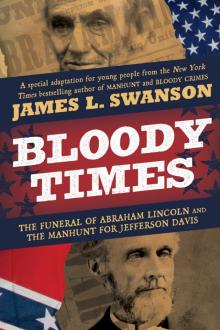 Bloody Times: The Funeral of Abraham Lincoln and the Manhunt for Jefferson Davis
Bloody Times: The Funeral of Abraham Lincoln and the Manhunt for Jefferson Davis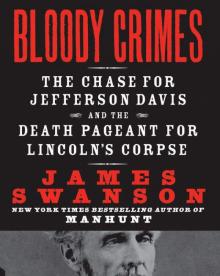 Bloody Crimes: The Funeral of Abraham Lincoln and the Chase for Jefferson Davis
Bloody Crimes: The Funeral of Abraham Lincoln and the Chase for Jefferson Davis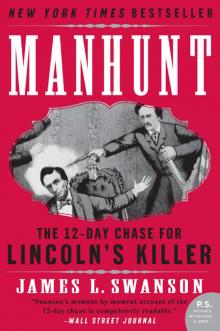 Manhunt: The 12-Day Chase for Lincoln's Killer
Manhunt: The 12-Day Chase for Lincoln's Killer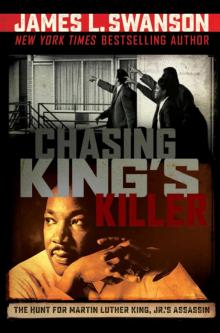 Chasing King's Killer: The Hunt for Martin Luther King, Jr.'s Assassin
Chasing King's Killer: The Hunt for Martin Luther King, Jr.'s Assassin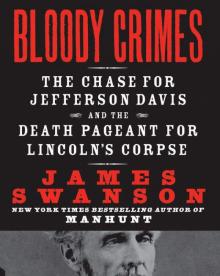 Bloody Crimes
Bloody Crimes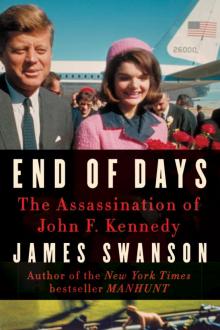 End of Days
End of Days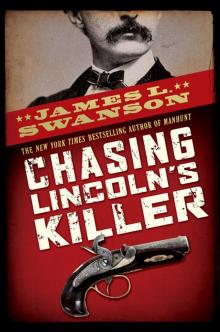 Chasing Lincoln's Killer
Chasing Lincoln's Killer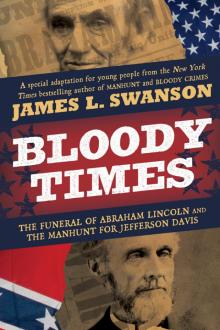 Bloody Times
Bloody Times Manhunt
Manhunt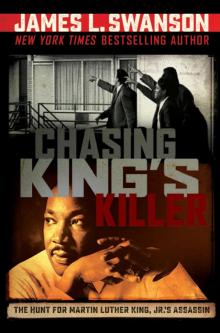 Chasing King's Killer
Chasing King's Killer